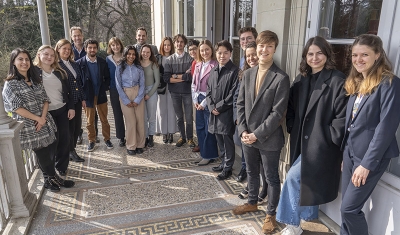Our Teaching Assistant Joshua Niyo Receives the Best Paper Prize at the 2019 AHRI Conference


Geneva Academy
17 September 2019
Joshua Niyo, Teaching Assistant at the Geneva Academy and PhD Candidate at the Graduate Institute of International and Development Studies received the best paper prize at the Association of Human Rights Institutes (AHRI) 2019 Conference for his paper ‘Legal Obligations for Armed Non-State Actors: Can IHL and IHRL Learn from Each Other?’.
The 2019 AHRI Conference, which took place at the University of Potsdam and brought together academics working on international humanitarian law (IHL) and human rights, focused on the challenges ahead for human rights and international humanitarian law (IHL) 70 years after the adoption of the Geneva Conventions.
Joshua Niyo is the first recipient of this new prize, which follows a call for paper launched back in January 2019.
The paper explores the principal areas of concern regarding the practical outworking of an IHL /international human rights law mutually enforcing paradigm with regard to the protection of life and personal liberty. Specifically, it addresses targeting and the requirement to investigate the loss of life and the legality of detention in non-international armed conflicts with regard to organized armed non-state actors.
Joshua Niyo presented the paper during a panel on the doctrine of IHL and international humanitarian law.
‘It was a great opportunity to engage on the legacy of the 1949 Geneva Conventions now at 70. The scope of the papers presented was both broad and in-depth, with the phenomenon of armed non-state actors taking some prominence. I thank God for this achievement and the organizers for selecting me and I hope my paper and this prize contributes to the general discourse on the need to engage with these actors in the context of international law’ underlines Joshua Niyo.









